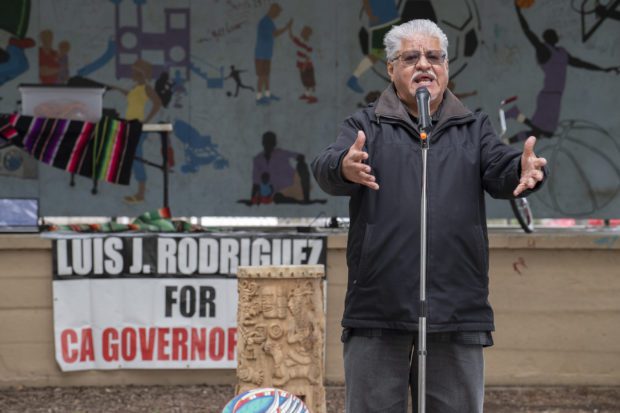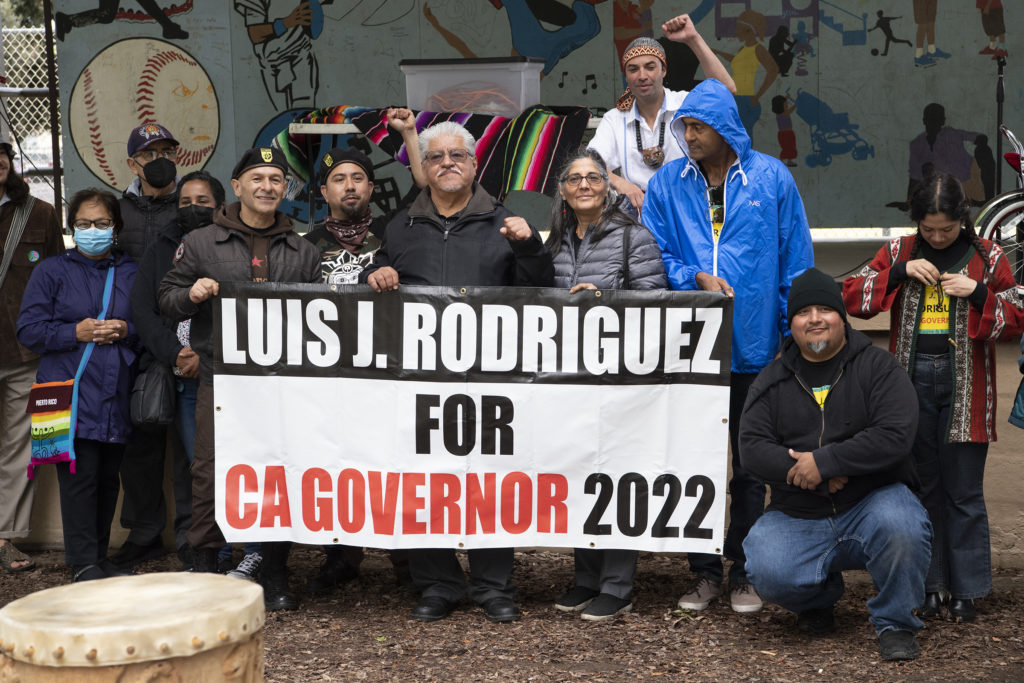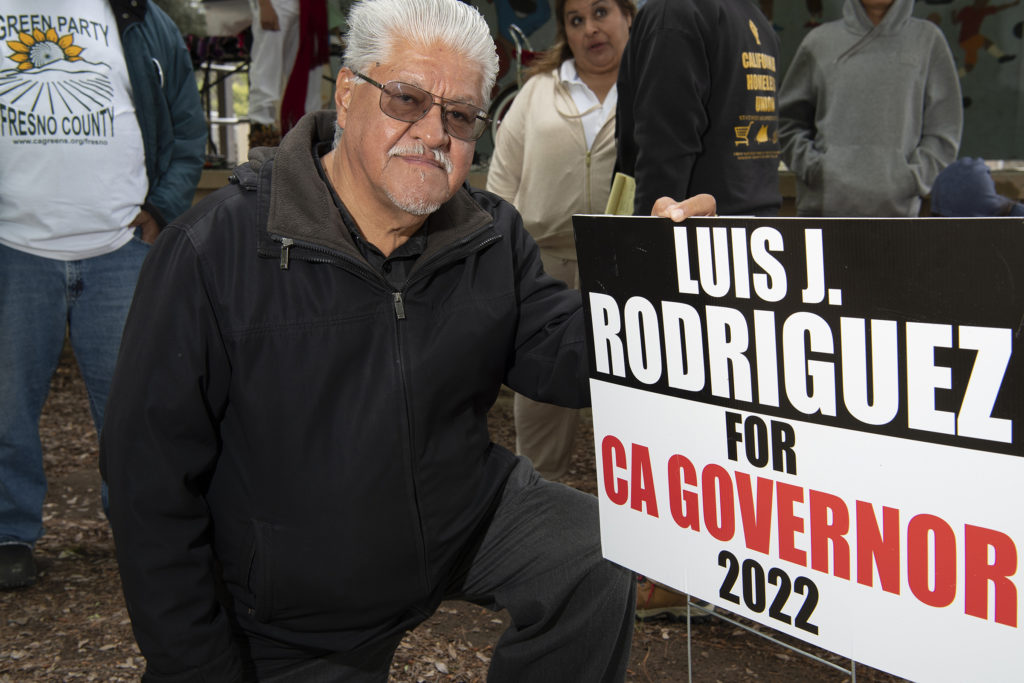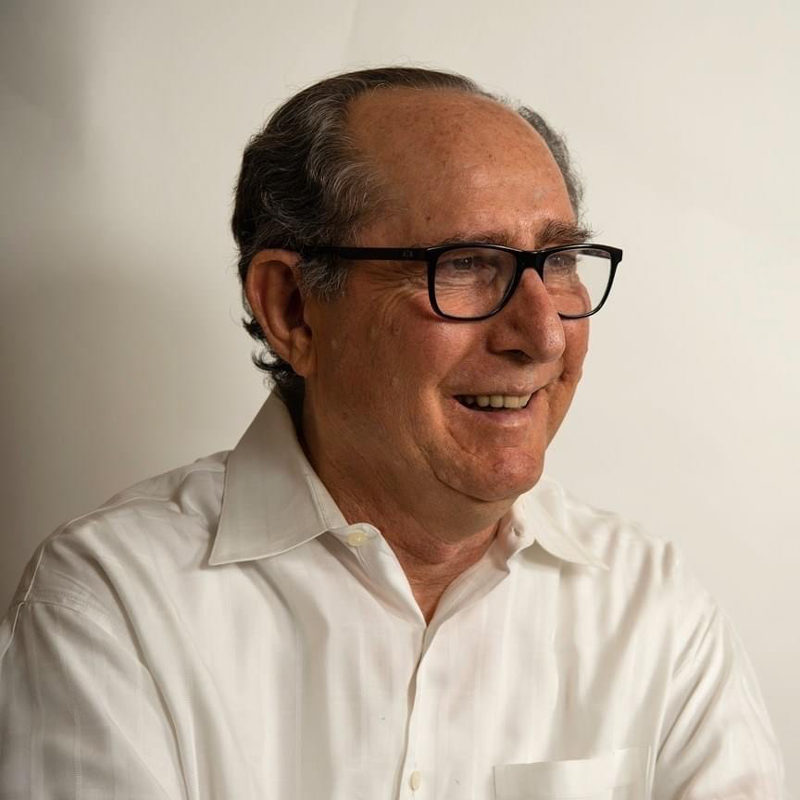

Luis J. Rodriguez came to Fresno on April 16 for a kickoff of his Green Party gubernatorial election run. The following week he spoke with the Community Alliance’s Peter Maiden by phone from a Southern California backyard, touching on his work and his campaign.
Peter Maiden: You’ve written extensively about your life as a young person, when you were involved in gang life. Your memoir Always Running is taught in so many classrooms. When did you start writing?
Luís J. Rodríguez: Well, I would have to say it started when I would go to the public library. At 15, I used to actually live in the streets. I was mostly homeless, sometimes living in garages or things like that.
I would find refuge in the public library downtown. And I think that sparked the idea that I could write. For some reason, I loved all the books I was reading, and then this idea came up that I could write. And I started to write little things here and there. I remember that I really took it on when I was in jail. When I was 16, I was put in the Hall of Justice jail.
And when people were playing cards or goofing around, somebody [might have] a pad of paper, a pencil and I started writing. And I remember that was the beginning of the seed that got planted.
I kept writing even in my most troubled days, even when I was homeless. I carried a little writing pad, and at one point I found an old typewriter that my dad had thrown away, practically. He had it in the garage, just pushed aside with all kinds of things and I picked it up and it was all broken up, but I used it and it helped me type some of my writings at the time.
PM. Was it your writing that allowed you to turn your life around?
LJR: I consider it as one of the keys that helped me turn my life around. There were a lot of things, but writing was definitely important because, you know, the idea that you don’t have a voice, that your voice doesn’t matter I think is very, very prominent, especially in poor communities.
For some reason, and I can’t tell you why, I felt my voice was important. I’ve always had this feeling. Nobody told me that, nobody supported that, I didn’t have anything to back that up other than my own internal push, you know, and my own internal drive, that what I have to say and what I’m seeing in the world is important. And I think that helped because you can get distracted so easily.

You can forget, you can say, “Ah, I don’t want to write.” You can have those moments where you think, “Who cares what I write,” you know what I’m saying? But I never really totally let it go that I needed to write, tell these stories and bring my voice out there.
PM: Did you ever imagine that you would publish poems, stories, essays, a children’s book and a novel and be the recipient of multiple writing awards?
LJR: No, never. Nothing in what I was doing calculated any of that. I had no idea what that part of the world meant. I wanted to write. I think about what I did when I was 15, walking among those shelves, looking for books to read—I think I had a little vision there.
It wasn’t very long. [It was] of having a book with my name on it. You know what I’m saying? Because there were no García’s, no Rodríguez’s, no Lopez’s. There was nobody’s name like that.
And I think that I had an imagination there, a short one where I thought “Man, what if a book with my name was on there.” I mean, that’s kind of a crazy thing for somebody to think about when writing wasn’t what anybody set up for me, but it’s just a vision.
And now, years later, you go to those shelves, and you go to the sections, and I have all my books in those libraries now. So it is something that I couldn’t imagine, but somehow it was connected to some deep destiny thing. It was something that I was meant to do. I’m glad I did it. I could have gone off. I could have not done it. But I’m glad that I did it.
PM: Were you aware as a youth that you wanted to get involved in politics?
LJR: Well, it’s kind of funny! I’ll tell you a story. When I was about 10 years old, Lyndon Johnson was running for president against Goldwater. And we were just kids, and a couple of us—I don’t know if a teacher encouraged this or we just did it—we were passing out stuff about Lyndon Johnson to classmates.
Now people made fun of us. You know, it was a rough school. People bullied you all the time. So they made fun of me. What’s wrong with you? You know, trying to bully me. But for some reason I just did it. I don’t know why.
And again, it’s these little seeds that I look back on and they were planted somehow with me. Because I’ve always had a political end of what I was doing, either running for office or speaking on these issues.
I always looked at politics as a very important part of whatever I was involved with. It’s hard to explain. I don’t want to get mystical about it, I just want to point out that there is some interesting destiny.
PM: You first ran for governor of California on the Green Party ticket in 2014.
LJR: That was the first time as you know. In 2012, I was running for vice president, with Rocky Anderson for president, for the Justice Party. And then in 2014, I ran for governor with the Green Party’s endorsement.
PM: And in that primary you received 66,807 votes.
LJR: That’s what I got.
PM: 1.5% of the vote.
LJR: Right. There were 16 candidates, I think. And I beat all the independents and [other] third party candidates.
PM: What were the lessons of the 2014 campaign for you, and how might they influence your run this year?
LJR: Well, I learned firsthand that money matters. It’s sad because we don’t have public finance reform in this country. Big money comes in and even if you’re a good candidate, you’re not going to get very far.
We did everything we could to raise money. I don’t want to tell you how much it was—very little. A shoestring budget. But we did a lot with it. We went up and down the state 12 times. I met with a number of key people.
I went on marches with people. In Salinas, I marched against police killings; in Watts, I marched for better schools. I just went to as many places I could, but still big money controls pretty much all the politics. Maybe not locally as much, but especially the big state and national politics.
And that’s a problem. It’s something that I’m willing to speak on. I’m going to try to raise more money this time, but it’s still a big issue when it comes to being heard in politics—that there is no public finance reform.
PM: So, in your campaign this year, what are the central issues of your platform?
LJR: Last time, it was called “Imagine a New California.” Now it’s “Imagine a New California for Shared Well-Being, Then Let’s Build It.” It’s kind of long. I shortened it to “Dream and Deliver.”
I think we need a big dream in the state, a big dream about what the state can be and should be. And then we’ve got to find a big delivery to match it.

We shouldn’t have poverty; we shouldn’t have homelessness. We shouldn’t have deadly police practices. We shouldn’t have [people’s] healthcare all over the place: some people getting it and some not.
We have so many issues, and I don’t think that the fifth largest world economy should be having these kinds of issues. So, my main slogan is “Dream and Deliver.” And that’s what I’m trying to do.
PM: You had an event in Fresno on April 16. How did that go for you and how does the Central Valley figure in your campaign?
LJR: Fresno to me is key because it’s the doorway to the whole Central Valley. The Central Valley is the poorest part of the state. Most of the Central Valley is as poor as any place in the deep South.
Agribusiness is huge. And oil drilling. They’ve extracted so much profit from the land, but it’s not coming back to the people. I think it’s important that we emphasize in the Central Valley the problem of a state that is not run with people’s needs in mind.
I’m glad we did it in Fresno. It actually got rainy and got windy. We didn’t have a lot of people there. It wasn’t a good day to actually have a kickoff, but the people that were there were great people, they were amazing. It was a quality of people.
We had Aztec dancers, we had the Brown Berets, we had a union of the homeless. We had a number of people there that were representative of a lot of the issues that I’m concerned about. So, in that sense, it was a success, and it was important that we start there, and we hope to come back to meet with other people up and down the Central Valley.
PM: Is there anything else you’d like to tell our readers?
LJR: Well, only that I really want people to know how easy it is to vote. In the primary, anybody can vote. You don’t have to be Green to vote for me. You can be a Democrat. You can have No Party Preference. Anybody can vote for me in the July primary.
I think that people should make sure they’re registered and vote early. And I would like for them to put me as the primary challenger to [Governor Gavin] Newsom on the way to November. I think I’m the one person that can really challenge him.
Maybe they like Newsom. They can still see me as a proper challenge for Newsom all the way to November, bringing up the issues he leaves behind.

